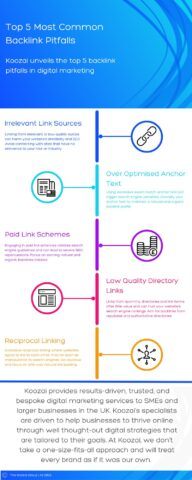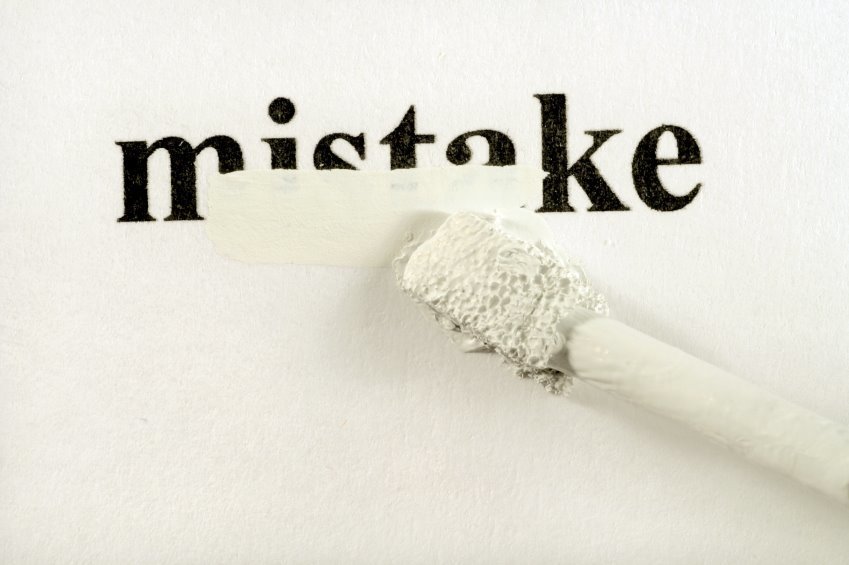Link building is a crucial aspect of any successful SEO strategy. However, even the most experienced professionals can make mistakes that could hinder their website’s growth and ranking potential. The Koozai infographic below highlights a few of the mistakes to avoid and in this article, we further explore other link building mistakes. Providing valuable insights to help you avoid these pitfalls. So, let’s learn about link building and how to optimise your approach effectively.

Understanding the Importance of Quality over Quantity
Link building is not a numbers game. One high-quality and relevant backlink from an authoritative website carries more weight than multiple low-quality links. Focus on building relationships with reputable websites in your niche to achieve better results.
Overlooking Relevance
Relevance is key to successful link building. Links should come from websites related to your industry or content. Irrelevant links can confuse search engines and harm your website’s credibility.
Neglecting Diverse Link Sources
Diversify your link sources to avoid overdependence on one type of backlink. Consider a mix of guest posting, social media sharing, and niche-specific directories to strengthen your link profile.
Ignoring the Power of Internal Links
While building external backlinks is essential, internal links play a vital role in guiding visitors through your site and distributing authority across your pages. Neglecting internal linking can result in missed opportunities for SEO benefits.
Falling for Black Hat SEO Techniques
Resist the temptation to engage in black hat SEO practices like buying links or using link farms. Search engines are getting smarter at detecting such tactics, and the penalties can be severe, causing irreparable damage to your website’s reputation.
Neglecting Content Quality and Relevance
Content is the foundation of link building. Ensure your content is informative, engaging, and relevant to your audience. Valuable content attracts natural backlinks from other websites.
Linking to Spammy or Low-Quality Websites
Be cautious when linking out to other websites. Ensure they are trustworthy and have a good reputation. Linking to spammy or low-quality websites can negatively impact your own site’s authority.
Disregarding Link Anchor Text
Anchor text plays a significant role in SEO. Using generic anchor text like “click here” misses the opportunity to optimise for relevant keywords. Be strategic in your anchor text choices to enhance link relevance.
Failing to Update and Maintain Links
Regularly review your existing backlinks and ensure they are still valid and relevant. Broken links and outdated content can harm your website’s SEO efforts.
Relying Solely on Automated Link Building
Automated link building tools may promise quick results, but they often lead to spammy and irrelevant links. Manual link building allows for better control and helps maintain the quality of your backlink profile.
Underestimating the Power of Social Media for Linking
Social media platforms are excellent avenues for sharing your content and attracting natural backlinks. Engaging with your audience and building a strong social media presence can boost your link building efforts.
Neglecting the Importance of Contributing Articles
Contributing to reputable websites in your industry can help you reach a wider audience and earn valuable backlinks. Don’t overlook the benefits of this link building technique.
Ignoring Analytical Data and Link Performance Metrics
Regularly monitor your link building efforts using analytical tools. Tracking link performance and metrics will help you identify what works and what needs improvement.
Not Building Relationships with Other Website Owners
Establishing relationships with other website owners can lead to natural link building opportunities. Networking within your niche can open doors to valuable backlinks.
Not Optimising for Mobile Users
It’s crucial to ensure your website is mobile-friendly. Mobile optimisation can impact your search rankings and overall link building success greatly.
Avoiding the top link building mistakes is essential for a successful SEO strategy. Remember, quality trumps quantity when it comes to backlinks. Stay relevant, diverse, and authentic in your link building efforts, and your website will gain authority and visibility in search engine rankings.
Mastering link building requires time, dedication, and a commitment to doing it the right way. By avoiding these mistakes and following best practices, you’ll be on the path to elevating your website’s SEO performance and achieving long-term success. If you’d like to read more why not download our free Boost Your Backlink Strategy guide.


Leave a Reply